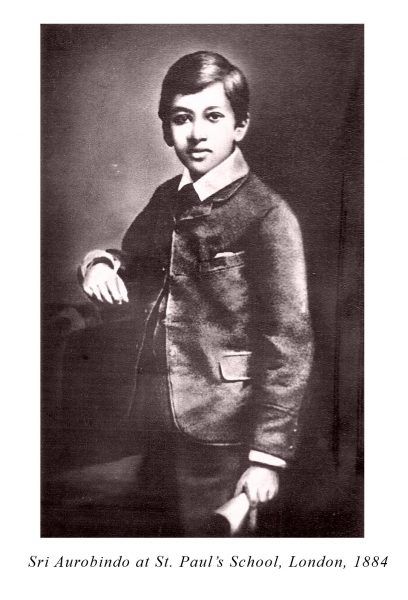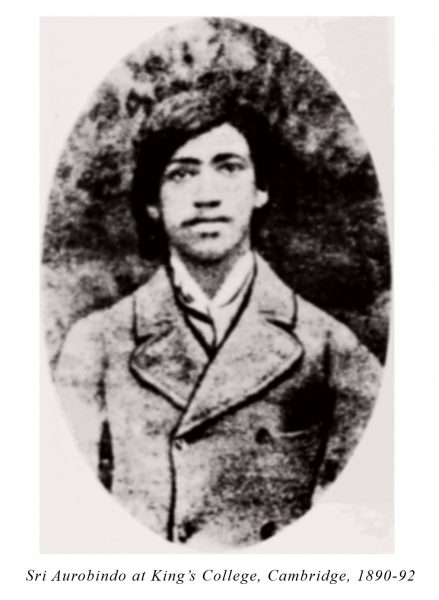Dr. Krishna Dhan Ghosh, who “was determined that his children should receive an entirely European upbringing”, took his three sons[1] to England, and “placed them with an English clergyman and his wife (Mr. & Mrs. Drewett) with strict instructions that they should not be allowed to make the acquaintance of any Indian or undergo any Indian influence. These instructions were carried out to the letter” and Sri Aurobindo “grew up in entire ignorance of India, her people, her religion and her culture.”[2]
Sri Aurobindo’s elder brothers, Benoy Bhusan and Manmohan, were sent to Manchester Grammar School, while Sri Aurobindo, being too young, was “educated privately by Mr. and Mrs. Drewett.” “Drewett was an accomplished Latin scholar”. He taught Sri Aurobindo Latin and English, while Mrs. Drewett taught him history, geography, arithmetic and French. Besides these subjects, Sri Aurobindo read himself the Bible, Shakespeare, Shelley, Keats, etc. Mr. Drewett grounded Sri Aurobindo so well in Latin that when Sri Aurobindo went to St. Paul’s School in London, the headmaster of that school “took him up to ground him in Greek and then pushed him rapidly into the higher classes of the school.”
When Sri Aurobindo was eleven years old, he had a sort of premonition that great revolutions were going to take place in the future and that he had a part to play in some of them. Not a mental idea, but a kind of inner feeling was growing within him that he had some great work to do, a mission to fulfil.
Sri Aurobindo “gave his attention to the classics at Manchester and at St. Paul’s; but even at St. Paul’s in the last three years he simply went through his school course and spent most of his spare time in general reading, especially English poetry, literature and fiction, French literature and the history of ancient, mediaeval and modern Europe. He spent some time also over learning Italian, some German and a little Spanish. He spent much time too in writing poetry. The school studies during this period engaged very little of his time; he was already at ease in them and did not think it necessary to labour over them any longer.”
Sri Aurobindo mastered French and learnt enough of Italian and German to be able to read Dante and Goethe in the original. His studies in the Classics, English and French literatures, and the entire history of Europe was not only extensive, but extraordinarily deep, ample evidence of which is found in his later voluminous writings, literary, historical, philosophical, political, cultural and sociological. His writings abound in such subtle and penetrating allusions and references that, unless one is very deeply read in those subjects, it becomes difficult to grasp the full import and catch the significant implications of his statements. He was a scholar possessing a wonderful memory, a revealing insight into the fundamentals of every subject, and a rare capacity for taking a synthetic and total view of the different aspects and the divergent provinces of knowledge — an integrating and harmonising faculty, global in its sweep and unfailing in its action. But, first and foremost, he was a poet, and a passionate lover of poetry — a seer-poet in the making, whose full-orbed splendour dazzles our eyes and thrills and illumines our soul in his later poetic creations, and particularly in his monumental epic, Savitri.
Mrs. Drewett, Mr. Drewett’s mother, wished to convert the three brothers to Christianity, but Mr. Drewett, who was a man of strong common sense, objected to it, and Mrs. Drewett had to give up her benevolent idea. In 1885 the Drewetts had left for Australia, and “the three brothers lived in London for some time with the mother of Mr. Drewett, but she left them after a quarrel between her and Manmohan about religion. The old Mrs. Drewett was fervently evangelical and she said she would not live with an atheist as the house might fall down on her.”
Sri Aurobindo’s name was registered at St. Paul’s and at Cambridge as Aravinda Ackroyd Ghosh, because when he was born, one Miss Annette Ackroyd, who later married Henry Beveridge, the then Officiating District and Sessions Judge of Rangpur, happened to be present at the christening ceremony, and was requested by Dr. K.D. Ghosh to give the child an English name. She gave her father’s name as that of the godfather of the child. But Sri Aurobindo “dropped the ‘Ackroyd’ from his name before he left England and never used it again.”
Regarding ‘Ackroyd’ having been tacked on to his name, which gave rise to a rumour that he had been converted into Christianity, and Mrs. Drewett’s pious solicitude for saving his soul, Sri Aurobindo once said: “There was once a meeting of non-conformist ministers at Cumberland when we were in England. The old lady in whose house we dwelt, i.e. Mrs. Drewett, took me there. After the prayers were over, all nearly dispersed but devout people remained a little longer and it was at that time that conversions were made. I was feeling completely bored. Then a minister approached me and asked me some questions. I did not give any reply. Then they all shouted, ‘He is saved, he is saved’, and began to pray for me and offer thanks to God. I did not know what it was all about. Then the minister came to me and asked me to pray. I was not in the habit of praying. But somehow I did it in the manner in which children recite their prayers before going to sleep in order to keep up an appearance. That was the only thing that happened. I did not attend the Church regularly. I was about ten at that time”.[3]
After his brother’s quarrel with Mrs. Drewett, Sri Aurobindo and his eldest brother, Benoy Bhusan, “occupied a room in the South Kensington Liberal Club where Mr. J.S. Cotton, brother of Sir Henry Cotton, for some time Lt. Governor of Bengal, was the secretary, and Benoy assisted him in his work. Manmohan went into lodgings. This was the time of the greatest suffering and poverty.” “During a whole year a slice or two of sandwich, bread and butter and a cup of tea in the morning, and in the evening a penny saveloy formed the only food”. This hardship was due to his father’s irregularity in sending them remittances from India. But Sri Aurobindo, neither in his youth nor ever afterwards, knew how to complain. Immersed in his studies, he took all privations and hardships in his stride with an unruffled calm. Subsequently Sri Aurobindo also “went separately into lodgings until he took up residence at Cambridge”.
Sri Aurobindo secured a senior classical scholarship of £.80 per annum when he joined the King’s College, Cambridge. This lessened his hardship to a certain extent. At Cambridge, Sri Aurobindo attracted the attention of Oscar Browning, a well-known figure there. In regard to Browning’s appreciation of his talent, Sri Aurobindo wrote to his father: “Last night I was invited to coffee with one of the dons and in his room I met the great O.B. otherwise Oscar Browning, who is the feature par excellence of King’s. He was extremely flattering and passing from the subject of Cotillions to that of scholarship, he said to me: ‘I suppose you know you passed an extraordinarily high examination. I have examined papers at thirteen examinations and I have never during that time seen such excellent papers as yours’ (meaning my classical papers, at the scholarship examination). ‘As for your essay, it was wonderful.’ In this essay (a comparison between Shakespeare and Milton), I indulged in my oriental tastes to the top of their bent, it overflowed with rich and tropical imagery, it abounded in antitheses and epigrams and it expressed my real feelings without restraint or reservation. I thought myself it was the best thing I have ever done, but at school it would have been condemned as extraordinarily Asiatic and bombastic. The great O.B. afterwards asked me where my rooms were and when I had answered he said: ‘that wretched hole!’ (and) then turning to Mahaffy: ‘How rude we are to our scholars! We get great minds to come down here and then shut them up in that box. I suppose it is to keep their pride down.’”
[1] The whole family went to England — Dr. Ghosh, Mrs. Ghosh, and their three sons and daughter Sarojini. Barindra, the fourth son was born in England.
[2] Unless otherwise stated, the quotations are from “Sri Aurobindo on Himself and on The Mother”, published by Sri Aurobindo Ashram.
[3] Life of Sri Aurobindo by Purani.





